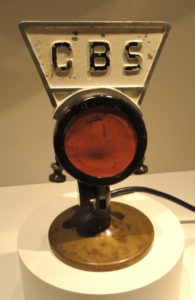Like everyone else who pays the slightest attention to theater in America, I was neither surprised nor displeased that this year’s Pulitzer Prize for drama went to Hamilton, about whose overwhelming excellence I have long been on record. I do, however, want to offer a cultural footnote to yesterday’s announcement, one that says something revealing about how journalism works in the age of the social media.
 I flew up from Orlando to New York on Monday morning after a lousy night’s sleep, and I fell into bed as soon as I got home for a much-needed nap. I checked Twitter as soon as I woke up to see what was going on, and found my feed full of Pulitzer-related tweets. One of them was a public message from CBS Radio News that read as follows: “Hi Terry. We would love to speak with you, if you have a moment. Please give us a call. Thank you!” A phone number followed, which surprised me. (I wonder how many people called it while I was still napping.)
I flew up from Orlando to New York on Monday morning after a lousy night’s sleep, and I fell into bed as soon as I got home for a much-needed nap. I checked Twitter as soon as I woke up to see what was going on, and found my feed full of Pulitzer-related tweets. One of them was a public message from CBS Radio News that read as follows: “Hi Terry. We would love to speak with you, if you have a moment. Please give us a call. Thank you!” A phone number followed, which surprised me. (I wonder how many people called it while I was still napping.)
For an instant I suspected you-have-won-one-million-dollars phishery, but the tweet didn’t look phony, and it occurred to me that since my Wall Street Journal reviews of Hamilton had been cited in the show’s publicity, a network producer might be calling to get a quote about the Pulitzer. So I called CBS and was immediately connected to someone who asked if I’d agree to be interviewed about the show for two minutes. “I can say what I have to say in ten seconds,” I replied.
Within a minute I heard a click on the line, and an unseen correspondent to whom I was never introduced asked, “What do you think of the Pulitzer going to Hamilton?” Sleepy though I still was, I opened my mouth and started talking, and for once in my life, the right words came out unhesitatingly: “Sometimes the obvious choice is also the right choice.” And that was that.
You will note that:
• I reflexively went to Twitter, not to any news-related site, to find out what was going on in the world.
• In order to get in touch with me, CBS Radio posted a public message on Twitter instead of trying to reach me by phone (a good thing, too, since I pulled the plug on my landline a decade ago and became a cellphone-only user).
• All this worked perfectly.
I’ve been tweeting since January of 2009. Strange to think that a technology that was close to brand-new seven years ago is now so much a part of my personal and professional existence that I take its existence for granted. Such, I guess, is life under the aspect of postmodernity.
